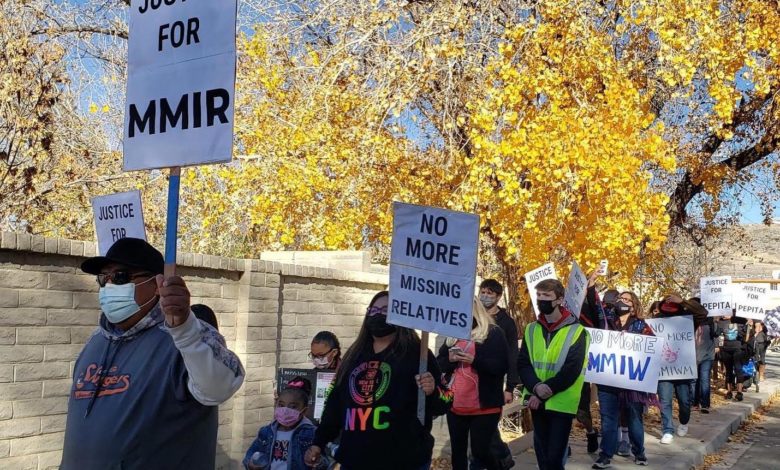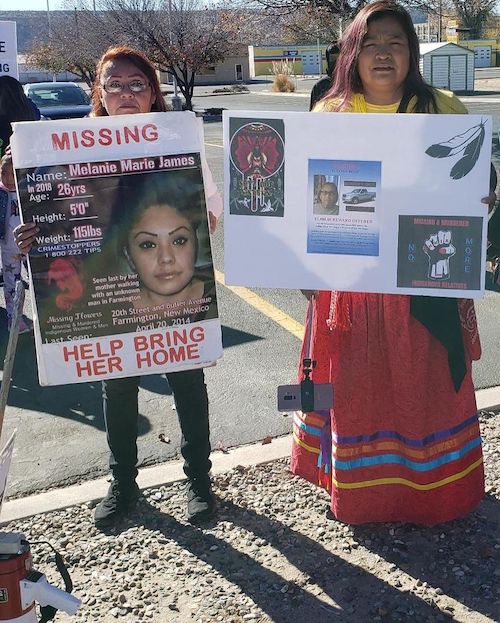
On Nov. 13, Indigenous families and supporters gathered in Farmington, N.M., for a march and rally for Missing and Murdered Indigenous Relatives (MMIR). Community members, while mourning and seeking justice for many lost relatives, demanded a federal investigation into the July murder of Zachariah Shorty. In solidarity, the PSL Albuquerque branch sent a contingent and materials.
Farmington is located in the state’s northwestern area, not far from the Navajo Reservation. The region, called Four Corners because of the confluence of the Colorado, Utah, Arizona and New Mexico state borders, is historically home to numerous Native American peoples. Other reservations exist nearby, and the Hopi, Zuni, and two Ute nations call the region home.
People from all over the Four Corners region are aware of the MMIR epidemic. Passersby in Farmington, after asking the purpose of the march, immediately knew of the issue and expressed their sympathy and support.
Zachariah Shorty — a son, a father and a brother who was known for his kindness and love of sports and music — went missing in late July. A week later, his body was found. In 2015, his brother had died in a car accident. These compounded tragedies are sadly familiar to many in the Four Corners region.
Marching through downtown Farmington, the crowd of about 70 carried signs demanding justice for several of the victims lost over the years: Zachariah Shorty, Pepita Redhair, Ella Mae Begay and Melanie James. Protestors chanted and whooped: “No more stolen brothers, no more stolen sisters, no more stolen aunties, no more stolen children.” Other chants demanded justice, transparency and reform.
At an emotional rally at the end of the march, Shorty’s family members shared the pain of losing a relative. They stated their frustration at detectives who dismissed the seriousness of the investigation or promised answers but failed to deliver.
Shorty’s sister, Eugenia Charles-Newton, said, “We’re standing here at another march asking for justice because we know justice hasn’t been served yet.”

Numerous families drove long distances to Farmington and expressed similar pain, dissatisfaction, and frustration with investigators. Some shared stories of state and federal agencies ending investigations early and without results, citing victims’ alleged connections to the selling or buying of drugs, addiction or suicide.
Family members complained that they are forced to take the initiative in conducting their own investigations, but they frequently meet with interference from state or federal agencies that shut down search parties and other investigative efforts.
Towards the end of the rally, Shorty’s mother, Vangie, released blue and black balloons for his favorite NFL team and played a recorded song performed by him.
The crowd then parted as a musician concluded the program with a talk on suicide and addiction awareness, and then provided support information and materials to the crowd.
It is no coincidence that 50 years ago, the American Indian Movement began organizing in towns like Farmington. AIM protested many of the same issues of violence and government inaction. Some of the people who had marched as teenagers in the 1970s marched again in 2021 for Zachariah Shorty.
Indigenous families and their supporters know that the epidemic of missing and murdered relatives is just one continuation of colonial violence against them. Indigenous communities in the Four Corners region have long demanded justice and change in institutions that give them no results. The coalition of victim’s families, community members experiencing racism, supporters and organizers will continue to fight for change so that missing loved ones can find justice, and so that those who are still here can have confidence that their future will be safe.





